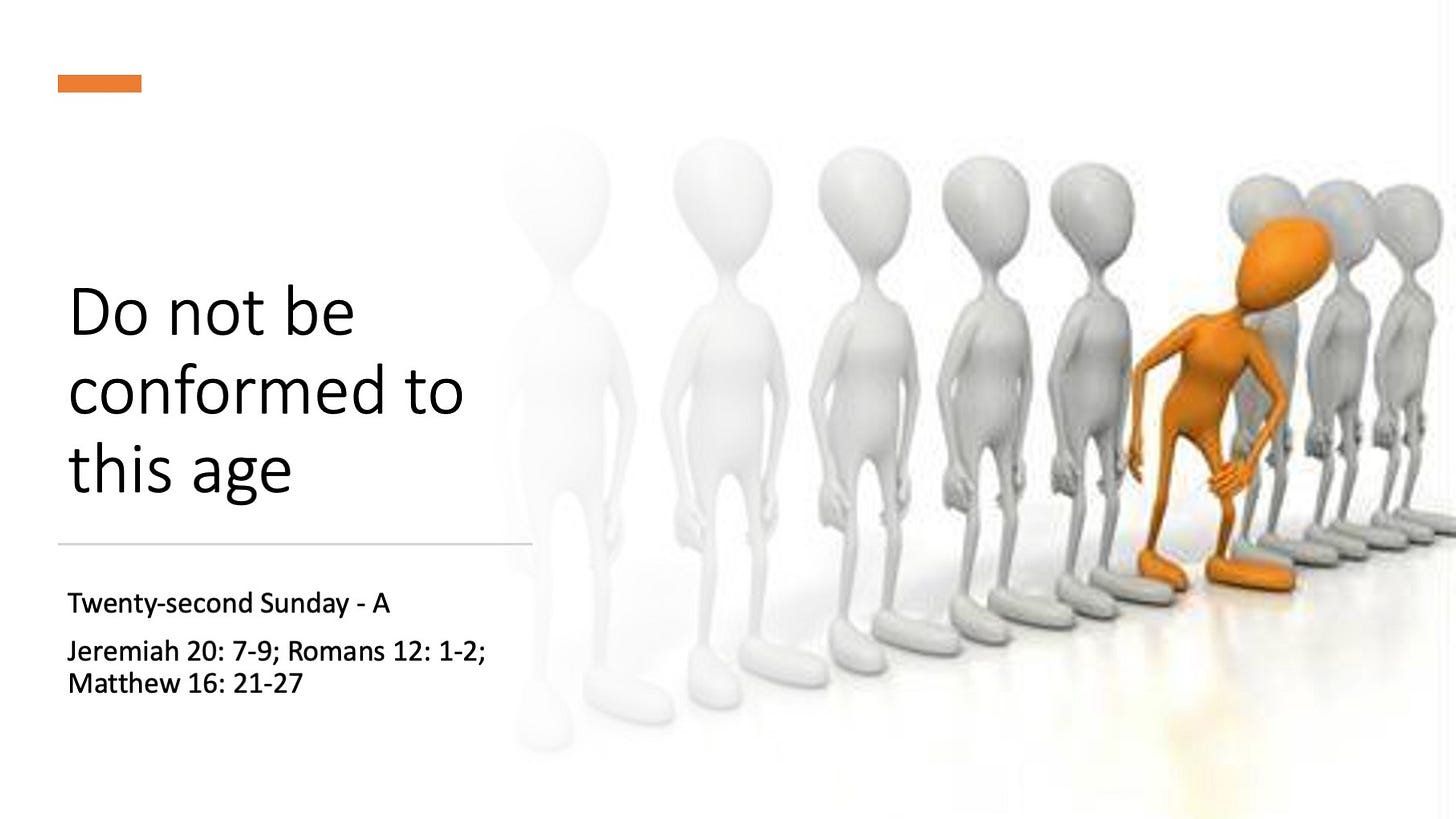Jeremiah 20: 7-9; Romans 12: 1-2; Matthew 16: 21-27
Today's liturgy of the Word calls us to think and live differently than people of our time. At the end of the second century, an unknown writer compared Christians in the world to the soul in the body. For centuries we have been the avant-garde of the world in science, art, and social life, laying the foundations of contemporary Western culture with its human rights, democracy, and religious freedom. And how is it today?
"You duped me, O Lord, and I let myself be duped" (Jer. 20:7). Who was a prophet of Israel? A reed swaying in the wind? A man living in palaces? (Matt. 11:7-8). No. He was a person whom God showed the enormity of evil and injustice that we commit on earth and commanded him to speak about it. His criticism was mainly directed at the leaders of the nations who thought themselves to be above the law, but the ordinary people were not without guilt either. It was an extremely difficult vocation - Jeremiah was tempted to quit it (Jer. 20:9) - but through courage and faithfulness to the truth, the prophets of Israel have become the inspiration for many to change the world for the better.
The will of God (Rom. 12:2) was that Jesus would go to Jerusalem, die there for the salvation of the world, and on the third day, he would rise (Matt. 16:21). But what is the desire of the apostles? The restoration of the kingdom of Israel (Acts 1:6). In their view, the Messiah was to defeat the Romans and not to be killed by them (Matt. 16:22). Their thinking, conforming to "this age" and opposing God's plan of salvation, reveals its satanic face. Peter "took" Jesus aside and Satan "took" Jesus to the top of the temple (Matt. 16:22; 4:5). Jesus rebuked both. To Satan Jesus says, "go away!" (Matt. 4:10), and to Peter, "go behind me" (Matt. 16:23). The difference is that Satan cannot repent and follow Jesus but the human being can.
What does it mean to think as human beings do? Strive to gain the whole world at the price of one's own soul (Matt. 16:26). What does it mean to think as God does? Deny myself, take up my cross and follow Jesus (Matt. 16:24). There are only two choices in life. There is a highway leading to perdition and a path leading to eternal life (Matt. 7:13-14), a house built on the sand or the rock (Matt. 7:24-27). Unfortunately, we tend to make choices based on the opinions of the majority, forgetting that falsehood had 400 preachers but truth only one (see 1 Kings 22:1-40) and that many choose the wide gate leading to doom (Matt. 7:13).
"Whoever loses his life for my sake will find it" (Matt. 16:25). At the center of our faith is the mystery of Christ's death and resurrection. We participate in it through the sacrament of baptism when we die to sin and begin a new life for God. The cross is a narrow gate leading to life (Matt. 7:13-14). Saint Maximilian Kolbe knew it when he offered his body "as a living sacrifice, holy and acceptable to God" (Rom. 12:1). His death became a sign of victory over the Nazi system of contempt for man and God. He did not die. He gave his life for his brother, and after momentary anguish, he now experiences eternal happiness (Wis. 3:5).
"Do not be conformed to this world, but be transformed by the renewal of your mind" (Rom. 12:2). Let us be different. Let us have the courage to stand up for the truth, proclaim that only God can satisfy the desire of our hearts (Ps. 63:2), and allow Jesus to lead us through the cross to the fullness of life.




